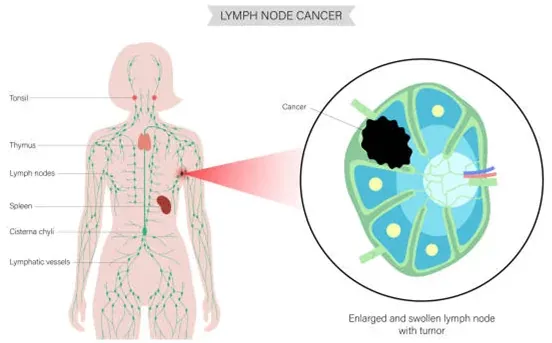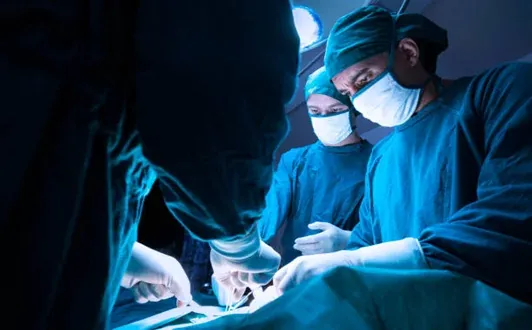Are you diagnosed with lymphoma after breast cancer and are seeking effective treatment? If so, our highly qualified and experienced oncologists at MACS Clinic can help.
Our team, led by Dr. Sandeep Nayak, an esteemed surgical oncologist in India, offers comprehensive cancer treatment in Bangalore. We focus on providing personalized care, utilizing the latest advancements in medical technology to help you face lymphoma after breast cancer with confidence and resilience.
Can You Have Lymphoma After Breast Cancer?
According to research, around 10-20% of breast cancer survivors may develop lymphoma later in life. This may sound alarming, but it’s essential to understand that each person’s journey is unique. Lymphoma can occur months or even years after successful treatment for breast cancer.
Remember, not everyone who has had breast cancer will develop lymphoma. It’s crucial to stay vigilant about your health and promptly report any unusual symptoms to your oncologist. Early detection and appropriate treatment can make a significant difference in managing lymphoma after breast cancer.
Are Lymphoma and Breast Cancer Linked?

Research indicates that lymphomas are known to occur in patients who have had breast cancer. The exact reasons for this link are not fully understood. However, it is believed that genetic predisposition, previous cancer treatments, and changes in the immune system may contribute.
Therefore, it’s essential to stay vigilant and get regular check-ups even after successful breast cancer treatment. Your oncologist can provide personalized guidance based on your medical history and risk factors.
Need assistance understanding your diagnosis? Consult seasoned oncology specialists for personalized advice and guidance.
What is Usually the First Symptom of Lymphoma?
The first symptom of lymphoma varies from patient to patient. It depends on the type and location of the lymphoma. However, one common early sign to watch out for is swollen lymph nodes, typically in the neck, armpit, or groin area. These swollen nodes might not be painful but can be noticeable to the touch.
Studies have shown that around 80% of people with lymphoma experience swollen lymph nodes as the initial symptom. You may also experience unexplained weight loss, fatigue, and night sweats. Keep in mind that these symptoms can be related to other conditions.
Nevertheless, seek prompt medical advice if you experience any concerning symptoms or persistent changes in your body. Early detection is crucial for effective treatment.
Challenges Faced
Some of the challenges faced when dealing with lymphoma after breast cancer treatment include:
Modalities for Lymphoma After Breast Cancer
Facing lymphoma after breast cancer can be overwhelming. However, understanding your treatment choices can help you feel more empowered.
- Surgical Treatment:
For treating lymphoma after breast cancer, surgical options may be considered, particularly if the lymphoma is localized. This may involve:
This procedure involves removing a lymph tissue sample for examination under a microscope. It helps determine the type and extent of lymphoma.
- Lymph Node Dissection:
In some cases, the surgeon may remove nearby lymph nodes to prevent the spread of lymphoma.
- Chemotherapy:
This treatment includes potent medications that target and destroy cancer cells. Oncologists often administer chemotherapy in combination with other therapies to treat the disease effectively. Studies suggest chemotherapy may be effective in up to 70% of cases.
- Radiation Therapy:
Radiation therapy utilizes high-energy beams to target and destroy cancer cells. It may be used alone or in combination with other treatments, such as surgery or chemotherapy. Research indicates that lymphoma radiation therapy can be helpful in 20-30% of cases.
Conclusion
Dealing with lymphoma after breast cancer is an undoubtedly challenging journey. However, you can overcome the challenges with the right support and guidance.
At MACS Clinic, Dr. Sandeep Nayak offers result-oriented cancer treatment in Bangalore tailored to individual needs. He provides cutting-edge treatments and compassionate support to help you achieve better health and well-being.
Always remember that you are stronger than you realize. Stay hopeful and stay strong as brighter days lie ahead.
For expert guidance on managing lymphoma after breast cancer, schedule an appointment today.
Frequently Asked Questions:
1. What are the chances of getting lymphoma after breast cancer?
The chances of developing lymphoma vary among patients. However, studies suggest around 10-20% of breast cancer survivors may develop lymphoma.
2. What cancer is common after breast cancer?
Common cancers that may occur after breast cancer include:
- Ovarian cancers
- Uterine cancers
- Colorectal cancers
3. Where is the first place breast cancer spreads to?
Breast cancer commonly spreads to the lymph nodes in the armpit (axillary lymph nodes) first.
4. What is the survival rate for lymphoma after breast cancer?
Survival rates vary depending on factors like the type and stage of lymphoma. However, advancements in treatment have improved overall outcomes.
5. What are the potential side effects of lymphoma treatment?
Common side effects of lymphoma treatment may include:
- Nausea
- Hair loss
- Fatigue
- Increased risk of infection
Your doctor may prescribe medications for the effective management of these side effects.






